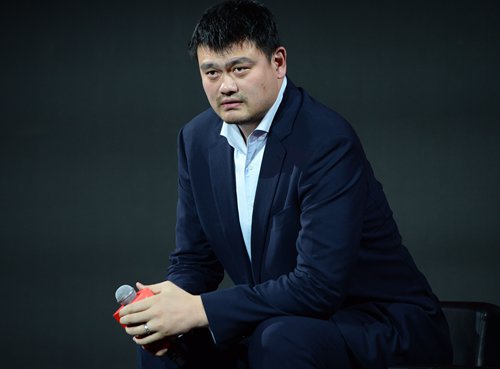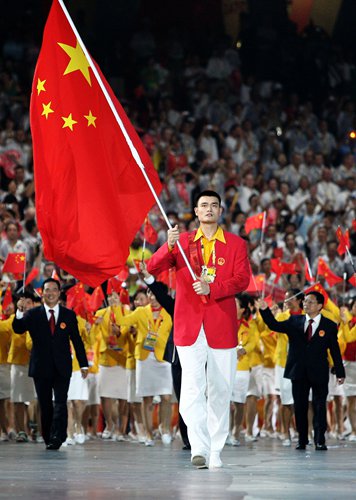IN-DEPTH / IN-DEPTH
Yao Ming: Building player base more important than cultivating stars
Playing for country

Yao Ming Photo: VCG
Former Houston Rockets superstar and current chairman of the Chinese Basketball Association (CBA) Yao Ming now spends most of his time pondering how to revive the sport of basketball in China.
In an interview in September, he told the Global Times that expanding the population who love the sport is an easier and more worthy objective than cultivating a handful of elite basketball players.
Before the 70th anniversary of the founding of the People's Republic of China, Yao talked to the Global Times about his ideas on how to rejuvenate Chinese basketball.
National pride
Growing up surrounded by professional athletes in Shanghai, Yao naturally felt admiration and pride for his parents, who both used to be basketball players.
"I was determined to look for my value in life in the stadium, just like my parents," Yao said.
However, during a sports competition in primary school, Yao threw two airballs, which upset him: "I came to realize that many things cannot be inherited from the older generation. Instead of innate skills, what counts more is hard work. That will bring you something."
Through his efforts in basketball, Yao was chosen as the No.1 pick in 2002 by the Houston Rockets at the age of 22. The following year, he led the Chinese team to win the Asian Championships.
Because of his spectacular performance on the basketball court, Yao soon became an iconic figure among Chinese fans.
In the 2008 Summer Olympic Games, Yao was chosen as the flag-bearer for the Chinese delegation. In his words, "When I look back at it now, I feel that precious experience will be with me my whole life."
"At such a moment of solemnity and sacredness, the only thing I thought was: Don't make any mistake. Holding the national flag as a representative of China is a very important job," Yao recalled of his experience at the Olympics opening ceremony.
Cultural differences
After Yao went to the US to play basketball, he experienced great differences between Chinese and foreign sports cultures.
"When it comes to playing basketball in China, it is inevitable that you will talk about the state-run sports system. Many great players have grown up under this system. Since 20 and 30 years ago, this system has played and continues to play a significant role," Yao said.
He noted this system can have its advantages. For example, "emerging players" are easy to find. "Players like me, who can attract attention easily and are given vast resources, can see rapid growth," Yao told the Global Times, adding that this system is a ladder that allows some players to grow quickly.
"When Chinese players go abroad to play professional basketball games, the disadvantages ... will be shown," he said, noting that entering the foreign professional field is like a college graduate entering society.
On what kind of culture is appropriate for basketball, Yao believes the world shares a unified basketball culture for global players: team spirit, leadership, responsibility and commitment.
He noted those qualities should be shown in any system, regardless of what country it is, and the expression of those qualities vary according to different cultural backgrounds.
"If you overemphasize that you are a player trained in China, instead of positioning yourself as just a basketball player, it will reduce the possibility of succeeding in the US," Yao said, noting that he would mention features of Chinese basketball culture only in his daily life.
"When I was in a match, I tried to avoid thinking about where I came from. What I need to think about is basketball," he noted.

Yao Ming carries China's national flag during the opening ceremony of the 2008 Summer Olympic Games at the National Stadium on August 8, 2008 in Beijing, China. Photo: VCG
Future objective
When looking at basketball as an individual sport, the only goal is to win the competition through athletics, Yao said.
As a result, he agreed that no matter what competition it is, the Chinese basketball team sets victory as its goal. At the same time, he said that on a macro level, they should not take the result as the only goal.
Instead, they need to think about nurturing the soil of basketball development in China.
Although China is a populous country with more than 1.4 billion people, it has never had an advantage in terms of its basketball population.
"The number of standing basketball players registered in the CBA, in other words, the players who undergo frequent training, is only 13,000, including both male and female players. That number in the US is much higher," said Yao.
He noted it is vital to expand the "basketball population" effectively in order to have a positive impact on China's basketball team, and this is a decision that needs to be made by senior leaders.
Yao once encountered a coach who had fostered several young basketball players whose names he had heard of. "They can usually play matches but may never have a chance to enter the national team. The coach felt ashamed because he thought he had not cultivated more excellent players," Yao said.
"But I don't think so. I believe that if we have more coaches like him, 100 or 200 or even 1,000 coaches, and each coach can train three to four basketball players who can rotate on the CBA field, the number of high-level basketball players will naturally increase. Our entire basketball level will be higher," Yao told the Global Times.
"Should we look for the next super player or work on the basic foundations? I think everybody knows which is easier and more valuable," he said.
Zhang Dan and Ni Hao contributed to the story
